 |
Convert OGV to H.264
|
OGV to H.264 Converter Software converts OGV files to H.264. With
an easy-to-use interface, it makes OGV to H.264 conversion routine as easy
as 1-2-3, without knowledge of OGV and H.264. The converter helps any beginners
and experts to create high quality video files in minutes. This program encodes
OGV to H.264 with professional quality. The OGV to H.264 Converter Software enables
more people enjoy the advantage about this advanced video
coding. The H.264 is one of HTML5 video formats, you can also
put the H.264 video to your website.
The software could convert more than 100 media foramts to popular video formats
and portable devices such as 3G2, CAF (Core Audio Format), WAV, M4B (MPEG-4 audiobook), AVI, TS, OGM, etc. It could convert FLV to 3G2, AVI to PPM image sequence, WebM to H.264, 3G2 to PPM image sequence, MOD to AIFF,
and so on.
OGV to H.264 Converter Software supports batch conversion and,
is full compatible with 32-bit and 64-bit editions of Windows 10/8/7/Vista/XP/2000.

What is OGV?
Video file that uses the Xiph.Org's open source Ogg container format; may
contain video streams that use one or more different codecs, such as Theora;
can be played using a variety of media players. Theora supports intra-coded
frames and forward-predictive frames, but not bi-predictive frames which
are found in H.264 and VC-1. VP3 video compression can be decoded using
Theora implementations, but Theora video compression usually cannot be
decoded using old VP3 implementations. This is also true for videos encoded
with any implementation of the Theora I specification since the format
freeze. VP3.1 was introduced in May 2000 and followed three months later
by the VP3.2 release, which is the basis for Theora. Evaluations of the
VP3 and early Theora encoders found their subjective visual quality was
inferior to contemporary video codecs. More recently however, Xiph developers
have compared the 1.1 Theora encoder to YouTube's H.264 and H.263+ encoders,
in response to concerns raised in 2009 about Theora's inferior performance
by Chris DiBona, a Google employee. They found the results from Theora
to be nearly the same as YouTube's H.264 output, and much better than the
H.263+ output. Theora is an open and royalty-free lossy video compression
technology being developed by the Xiph.Org Foundation as part of their
Ogg project. Based upon On2 Technologies' VP3 codec, Theora competes with
MPEG-4, WMV, and similar low-bitrate video compression schemes. Theora
video streams can be stored in any suitable container format. Most commonly
it is found in the Ogg container with Vorbis or FLAC audio streams which
provides a completely open, royalty-free multimedia format. It can also
be used with the Matroska container.
What is H.264?
H.264 is a codec used to create MP4 files. Its wide compatibility and range
of features has made it a popular encoder for videos. CPU based solutions
are known to be much more flexible, particularly when encoding must be
done concurrently in multiple formats, multiple bit rates and resolutions
(multi-screen), and possibly with additional features on container format
support, advanced integrated advertising features, etc. High Profile (HiP):
The primary profile for broadcast and disc storage applications, particularly
for high-definition television applications (for example, this is the profile
adopted by the Blu-ray Disc storage format and the DVB HDTV broadcast service).
HTML5 is being developed by the HTML5 working group as an open standard
to be adopted by all web browser developers. The product of this partnership
effort is known as the Joint Video Team (JVT). In December 2001, VCEG and
the Moving Picture Experts Group (MPEG - ISO/IEC JTC 1/SC 29/WG 11) formed
a Joint Video Team (JVT), with the charter to finalize the video coding
standard. The Scalable Video Coding extensions were completed in November
2007. In June 2004, the Fidelity range extensions (FRExt) project was finalized.
Therefore, the difference between hardware and software based implementation
is more on power-efficiency, flexibility and cost. The maximum bit rate
for High Profile is 1.25 times that of the Base/Extended/Main Profiles,
3 times for Hi10P, and 4 times for Hi422P/Hi444PP. H.264 is perhaps best
known as being one of the codec standards for Blu-ray Discs; all Blu-ray
Disc players must be able to decode H.264. Controversies surrounding the
H.264 video compression standard stem primarily from its use within the
HTML5 Internet standard.
How to Convert OGV to H.264?
- Free Download
OGV to H.264 Converter Software
- Install the Program by Step-by-step Instructions
- Launch OGV to H.264 Converter Software
- Choose OGV Files

Click "Add Files" to choose OGV files.
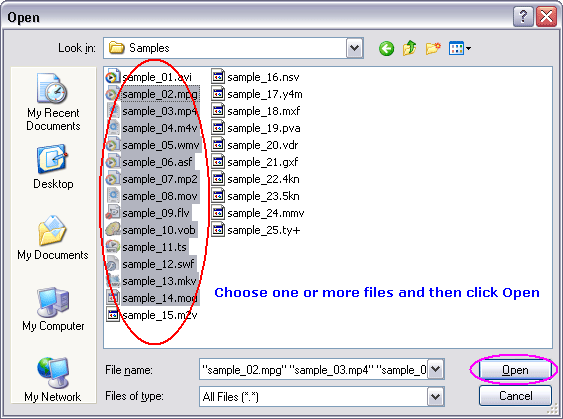
Choose one or more OGV files you want to convert and then click Open.
OGV to H.264 Converter Software will open OGV files and get file information
of the file such as width, height, frame rate, video bit rate, audio sample rate,
audio bit rate, audio channels, and then display the information of OGV file
at conversion list.
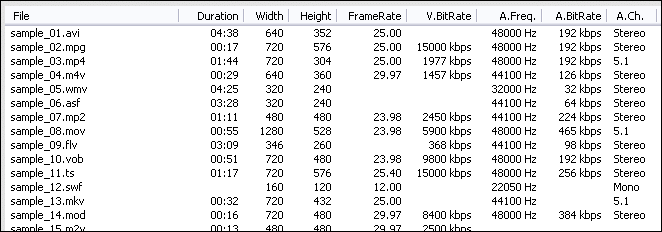
- Choose Output Format
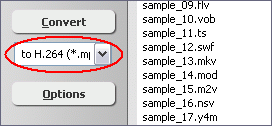
Click on combo box of output format and then choose "to H.264".
- [Optional, for advanced user]
Set H.264 Encoding Parameters
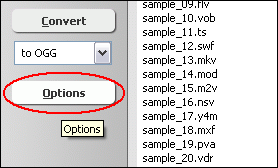
If you want to change H.264 encoding parameters such as bit rate, frame rate,
video size, and aspect ratio, please click "Options".
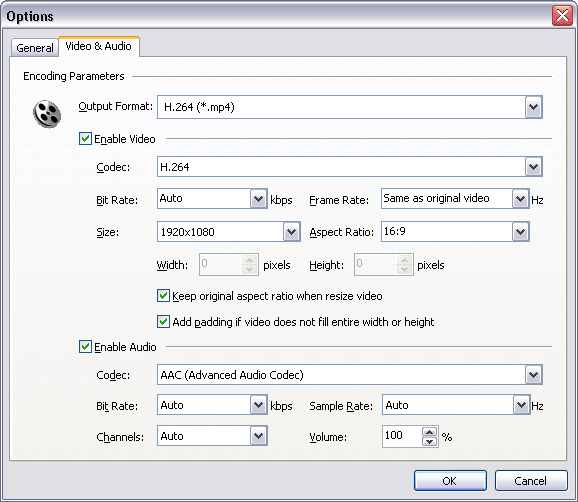
And then, switch to tab "Video & Audio" and choose "H.264
(*.mp4)" at "Output Format", and then set options for
video and audio.
- Convert OGV to H.264
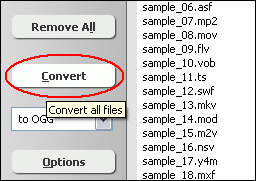
Click "Convert" to convert all OGV files in list to H.264 format.

The software is converting OGV files to H.264.
- Play & Browse
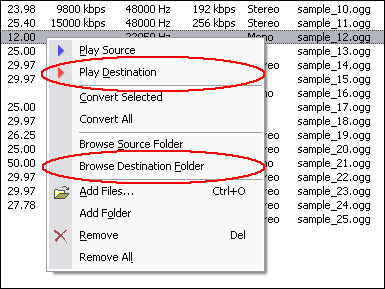
When conversion completes, you can right-click converted item and choose "Play
Destination" to play the outputted H.264 file; or choose "Browse
Destination Folder" to open Windows Explorer to browse the outputted H.264
file.
- Done
Top
OGV to H.264 Converter Software is 100% clean and safe to
install. It's certified by major download sites.

Convert OGV to H.264 Related Topics:
|











